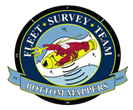Fleet Survey Team
| Fleet Survey Team | |
|---|---|
|
Fleet Survey Team Logo | |
| Active | 2005 - Present |
| Country | United States of America |
| Branch | Navy |
| Type | Rapid-response team |
| Role | Expeditionary hydrography |
| Size | Approximately 65 civilian and military personnel |
| Part of |
Commander, Naval Meteorology and Oceanography Command Naval Oceanographic Office |
| Garrison/HQ | Stennis Space Center |
| Commanders | |
| Current commander | CDR David Kuehn |
Composed of approximately 65 military and civilian members, Fleet Survey Team (FST) is collocated with the Naval Oceanographic Office and Commander, Naval Meteorology and Oceanography Command, at Stennis Space Center, MS.
FST, an eschelon-five command since 2006, is tasked with performing an unparalleled function within the U.S. Navy.
The command enables combatant commanders with access in the littoral regions through expeditionary hydrography. When forces are armed with detailed descriptions of the environmental conditions they could face, operations have a greater chance of being safely and efficiently executed.
FST gathers the needed information via timely, self-contained hydrographic surveys in response to combatant commanders’ requests. These requests frequently are for areas where Navy operations will take place or where charting accuracy is uncertain.
FST members (both civilian and military) can quickly deploy to areas around the world outfitted with equipment to perform surveys from various boats of opportunity. Because of these unique capabilities, civilian and military members of FST have deployed to areas of combat like the Middle East to perform near-shore surveys to collect data which aids in the safe navigation of U.S. forces and supplies traversing the area.
FST members have also played significant roles in charting areas affected by natural disasters such as the south Asia tsunami of 2004 and hurricanes Katrina and Rita in the Gulf of Mexico.
Command personnel offer a unique blend of military and civilian knowledge and experience. Enlisted sailors routinely qualify as level two military hydrographers, certifying their skills.
In addition to their strong backgrounds in math, science and engineering, officers and civilians frequently obtain master’s degrees in hydrographic science through an ongoing program with The University of Southern Mississippi and are also recognized by the International Hydrographic Office as Category A hydrographers.
Fleet Survey Team command members are commonly known as the Fightin’ Crawdads in reference to the crawfish featured prominently in the FST logo.
